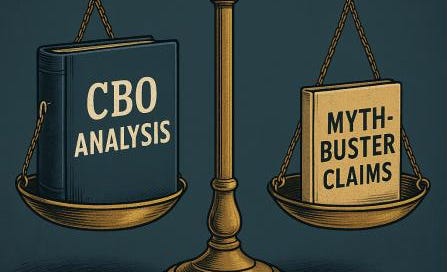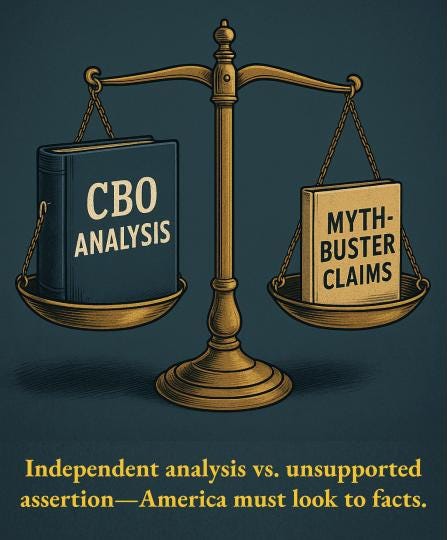When Facts Are Denied: Budget Disinformation and the Duty to Govern Honestly
This is about more than budget math. It’s about confronting disinformation, defending institutional truth, and upholding the constitutional duty to govern honestly.
Engage for Democracy | June 6, 2025
✏️ Editor’s Note
In earlier editions, we examined the grave constitutional concerns embedded in the House-passed omnibus tax and budget bill—H.R.1. In this edition, we shift our focus from structural threats to a more immediate concern: truth-telling versus disinformation. It is essential that Americans share a reality grounded in facts.
This edition responds to the White House’s June 4 press release—titled a “mythbuster”—which disputes official Congressional Budget Office (CBO) findings about the bill’s fiscal and social impacts. That release contains multiple demonstrably false claims, including the assertion that extending multi-trillion-dollar tax cuts will have “zero impact” on the deficit.
Why does this matter?
Budget manipulation is a well-documented authoritarian tactic. Around the world, autocratic leaders have eroded democratic institutions not only by defunding oversight and reshaping spending priorities, but also by distorting the economic facts that guide public understanding.⁷
Discrediting the CBO—an agency Congress created to provide objective budget analysis—isn’t just political messaging. It threatens to delegitimize lawful oversight and politicize institutional facts.
When the public no longer knows which sources to trust, democratic decision-making falters. That is the deeper danger—not just the fiscal cost of the bill, but the erosion of our ability to debate it based on a shared understanding of reality.
This edition is grounded in official, nonpartisan sources—including the Congressional Budget Office, the Committee for a Responsible Federal Budget, and the Open Government Partnership—to help cut through the disinformation and reaffirm why truthful budgeting, transparent process, and institutional trust are essential to a functioning democracy.
🧾 What Happened
On June 5, 2025, the nonpartisan Congressional Budget Office (CBO) released its official score of the “One Big Beautiful Bill,” passed by the House in May. Its findings were stark:
The bill would add $2.4 trillion to the federal deficit over 10 years.¹ ²
It would cause 10.9 million Americans to lose health insurance by 2034.³
It extends the 2017 Trump tax cuts, adds new ones, and repeals key offsets, including green energy credits and provider taxes that support rural hospitals.¹
The legislation slashes Medicaid and food assistance to partially offset the tax cuts, including by imposing work requirements that the CBO estimates will cause millions to lose coverage.¹
That same day, the Trump White House released a press statement dismissing the CBO analysis as a “hoax,” claiming—without independent corroboration—that the bill reduces the deficit by $1.4 trillion and represents “the highest level of mandatory savings in history.”⁵
The administration’s argument hinges on a controversial assumption: that continuing expiring tax breaks doesn’t “count” as a new cost. This is misleading. Under current law, those tax cuts are set to expire. Maintaining them requires new legislation—and that legislation carries a cost.
💡 Clarifying the Cost of “Extending” Tax Cuts
The 2017 tax cuts were designed to expire after a set period—many by the end of 2025.
The term “extending” can sound like a no-cost continuation of existing policy. But in budget terms, this is inaccurate. Once those cuts expire, keeping them in place requires passing new tax cuts, even if they mirror the old ones.
And like any new tax cut, they reduce projected federal revenue. Unless offset elsewhere, they increase the deficit.
Adding further weight to the CBO’s estimate, the Committee for a Responsible Federal Budget (CRFB)—a respected nonpartisan policy group—issued an independent analysis finding that the bill would add $3.0 trillion to the national debt, or $5.0 trillion if temporary tax breaks are extended.⁴ Their analysis confirms that:
The bill is front-loaded with high-cost tax cuts that primarily benefit higher earners and corporations.⁴
Claimed spending offsets are insufficient and often speculative.⁴
Cuts fall disproportionately on programs serving vulnerable Americans, including Medicaid, SNAP, and student borrowers.⁴
⚖️ Why It Matters
This isn’t just an argument about math. It’s a window into how factual analysis is being treated as a political inconvenience—and it violates all three pillars of democratic accountability:
1. 🏛 Constitutional Violations
The Constitution (Article I, Sec. 9) gives Congress—not the President—the power of the purse. Congress created the CBO in 1974 to ensure nonpartisan, transparent budget analysis. Undermining the CBO’s role disrupts this constitutional process and weakens the system that enables representative government to function.
📌 Fiscal decisions grounded in deception weaken the very mechanism by which Congress governs on behalf of the people.
2. ⚖️ Rule of Law Violations
The White House is substituting executive opinion for statutory analysis—and using its platform to discredit the lawful body tasked with evaluating federal spending. This is not ordinary political disagreement; it’s a rejection of legal oversight.
It also fits a broader pattern: dismissing court rulings, discrediting election officials, and undermining lawful checks when they conflict with political goals.
📌 The rule of law depends not just on courts—but on honest institutions and a shared commitment to fact-based governance.
3. 🧭 Erosion of Democratic Norms
Democracies function when leaders follow the same rules, regardless of political convenience. When a sitting president calls an independent fiscal review a “hoax,” it signals that even basic institutional analysis is vulnerable to partisan distortion.
This kind of rhetoric doesn’t just challenge a policy—it erodes public trust in government and in the concept of objective reality.
📌 It teaches Americans to doubt institutions, dismiss facts, and follow personalities instead of principles.
🔍 What the Constitution Doesn’t Say
Some have come to believe that if their preferred party enacts a policy, it must be legitimate. But policy preference is not the same as constitutional authority.
The Constitution does not say:
❌ “The party in power can rewrite budget math.”
❌ “Oversight can be ignored when politically inconvenient.”
It requires checks and balances, legislative debate, and adherence to truth—even when that truth is politically uncomfortable.
🧠 Bottom Line
One doesn’t need to be an economist to understand what’s happening:
The Trump administration is promoting a bill that adds trillions to the deficit, cuts healthcare, and delivers benefits heavily skewed toward the wealthy.
Independent experts said so.
Instead of engaging with those facts, the White House declared them false.
That’s not responsible governance. It’s a deliberate distortion of fiscal reality.
And the further we drift from constitutional processes and honest analysis, the harder it becomes to sustain a shared civic reality.
This isn’t just a policy disagreement. It’s a breakdown in democratic accountability—and that’s what weakens democracies. This moment demands clarity. The public deserves a government that tells the truth about costs, consequences, and tradeoffs. That’s not just good governance—it’s what the Constitution requires.
📬 Take Action
This bill has not yet passed the Senate; this is a moment for civic clarity and civic action. Contact your Senators and urge them to:
Reject any effort—by any branch of government—to discredit nonpartisan oversight or mislead the public about fiscal impacts.
Acknowledge the official Congressional Budget Office (CBO) and Committee for a Responsible Federal Budget (CRFB) analyses publicly
Hold hearings to assess the bill’s true fiscal and human impacts
Oppose any legislation that adds trillions in debt while cutting healthcare, nutrition aid, or support for vulnerable Americans
No matter your political affiliation, democracy depends on truthful governance. Tell your Senators: it’s time to lead with integrity.
1) 📩 Email your Senators and Representative all at once in 3 easy steps:
Copy the message below
Click here to Go to Democracy.io
Paste the message (personalize if you’d like), fill in your info, and click Submit
📝 Message to Congress
Uphold Truthful Governance and Fiscal Oversight
I am writing to express deep concern about the White House’s recent June 4 press release, which dismissed the Congressional Budget Office’s (CBO) official analysis of H.R.1—also known as the “One Big Beautiful Bill”—as a “hoax.” This characterization is false, unsubstantiated, and profoundly damaging to the institutional integrity of nonpartisan oversight.
As a member of Congress, your constitutional duty includes upholding the power of the purse and defending the role of Congress’s own budgetary watchdog, the CBO. Undermining its credibility is not just an attack on a particular analysis—it is an attack on the principle of objective, fact-based governance that sustains our democracy.
I urge you to:
Publicly affirm the findings of the CBO and the Committee for a Responsible Federal Budget (CRFB)—two nonpartisan bodies whose independent analyses show that H.R.1 would add trillions to the national debt while disproportionately cutting healthcare and nutrition programs.
Hold public hearings to examine the bill’s full fiscal and human impact before it proceeds further in the legislative process.
Speak out against any disinformation campaign—regardless of its source—that seeks to delegitimize lawful oversight mechanisms or mislead the American public about the bill’s true consequences.
Oppose any legislation that increases the deficit while stripping vital protections from the most vulnerable members of our communities.
This is not just a budgetary matter—it is a democratic one. Truthful governance is a constitutional responsibility. I am asking you, as my elected representative, to uphold that responsibility with courage, clarity, and commitment to the public good.
2) 📲 Text RESIST to 50409 or message via facebook.com/resistbot (where you can send an email, text, or fax!)
Copy the message below (and personalize if you’d like)
Text RESIST to 50409 or Message Via facebook.com/resistbot
📝 Message (Shorter format for Text Messages to Senators)
I'm writing to urge you to uphold truthful governance and fiscal oversight. The CBO and CRFB have shown that H.R.1 would add trillions to the deficit and cut essential programs. Discrediting nonpartisan analysis undermines democratic accountability. Please speak out publicly, hold hearings on the bill’s real impacts, and reject legislation based on misleading fiscal claims. Our democracy depends on facts and transparency.
📚 Footnotes
Congressional Budget Office, Estimated Budgetary Effects of H.R.1, the One Big Beautiful Bill Act, June 4, 2025. https://www.cbo.gov/publication/61461
CBO, Letter to Sen. Jeff Merkley on Debt Service Costs of H.R.1, June 4, 2025. https://www.cbo.gov/system/files/2025-06/61459-Debt-Service.pdf
CBO, Letter to Senators Wyden, Pallone, and Neal on Health Insurance Impacts, June 4, 2025. https://www.cbo.gov/system/files/2025-06/Wyden-Pallone-Neal_Letter_6-4-25.pdf
Committee for a Responsible Federal Budget, Breaking Down the One Big Beautiful Bill, June 4, 2025. https://www.crfb.org/blogs/breaking-down-one-big-beautiful-bill
The White House, MYTHBUSTER: The One Big Beautiful Bill Cuts Spending, Deficit — and That’s a Fact, June 4, 2025. https://www.whitehouse.gov/articles/2025/06/mythbuster-the-one-big-beautiful-bill-cuts-spending-deficit-and-thats-a-fact
Lisa Mascaro, Trump tax bill will add $2.4 trillion to the deficit and leave 10.9 million more uninsured, CBO says, Associated Press, June 4, 2025. https://apnews.com/article/cbo-deficits-tax-cuts-trumps-big-beautiful-bill-64d7de49aef62ba07b7f6f45c1ca73d1
Paolo de Renzio and Joseph Foti, “The Fiscal Autocrat’s Toolkit,” Open Government Partnership, May 13, 2025. https://medium.com/ogp-horizons/the-fiscal-autocrats-toolkit-e2c8090777ee. The authors identify seven common tools used by authoritarians to undermine checks and balances through fiscal control—including impoundment, budget secrecy, suppression of independent audit institutions, and data manipulation. Their analysis includes examples from Russia, Brazil, Turkey, and the United States.
Engage For Democracy editions are curated through close analysis of primary legislative documents and expert sources, with research and editorial support from OpenAI’s ChatGPT. All findings are independently reviewed and documented with verifiable citations. Engage For Democracy is a nonpartisan civic education project committed to constitutional accountability, the rule of law, and democratic norms. While every effort has been made to ensure accuracy, any inadvertent errors are mine alone.
📣 That’s today’s edition. We’ll be back with our next update on Monday.
Together, we can:
📚 Read to understand the stakes
🤝 Share to build a clearer civic reality
📬 Act by writing, emailing, and calling our elected officialsIn moments like this, using our voices matters. Holding elected officials accountable to the Constitution, the rule of law, and democratic norms is not just civic duty—it’s how we help democracy endure.
In solidarity,
Engage For Democracy




